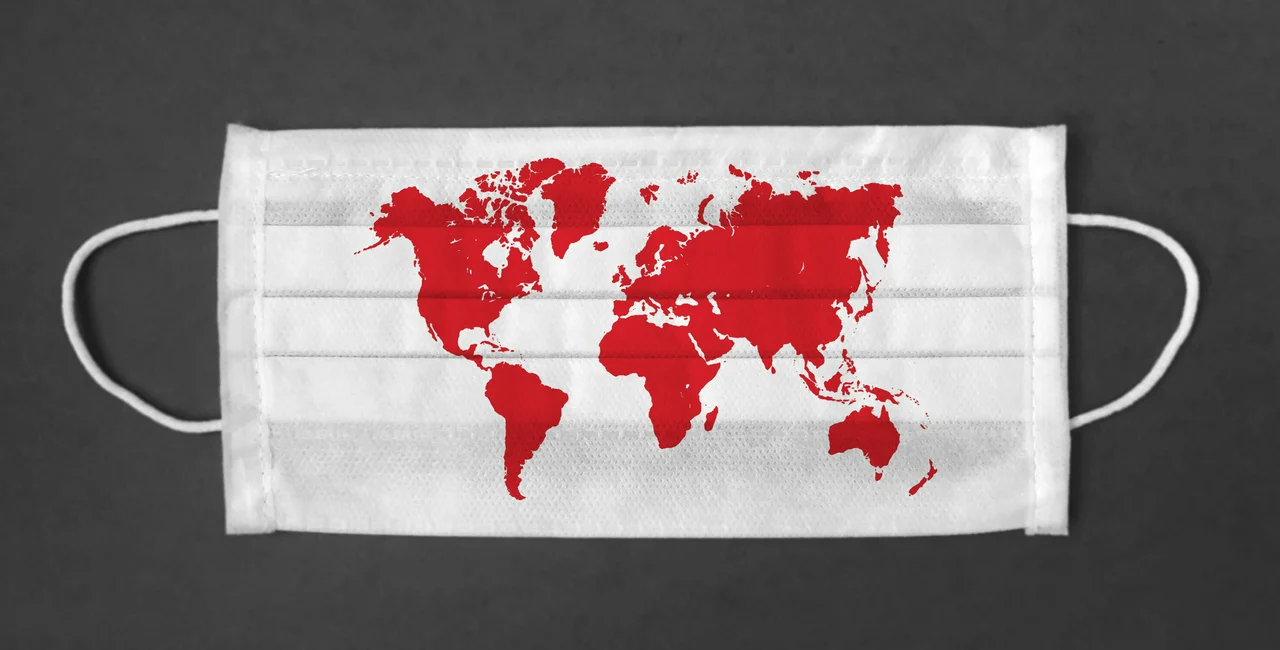The rules for COVID-19 testing will change for people entering the Czech Republic as of Friday and a new category of very high-risk countries will be created, Foreign Minister Tomáš Petříček said after a cabinet meeting on Monday. Petříček said it is necessary to react to the spread of new mutations of coronavirus.
People who will be coming from countries with very high risk will have to undergo a PCR test for coronavirus before they travel to the Czech Republic and go to quarantine after their arrival in the country. If they undergo another test five or more days afterward and it is negative again, they will be allowed to end their quarantine, but they will still have to wear at the very least an FFP2 respirator for five more days.
Estonia, Britain, Ireland, Latvia, Lithuania, Portugal, Slovakia, Slovenia, and Spain will be on the list of very high-risk countries, shown in the map below in dark red.
"I would like to emphasize that we need to respond to the spread of new coronavirus mutations in the same way as France or Belgium. Medium-risk countries are subject to the obligation to test before traveling to the Czech Republic, whether PCR or antigenic. In addition, for the high-risk category, testing is required five days after arrival, using the PCR test only. The ministry will also introduce a five-day quarantine obligation for very high-risk countries," explained Foreign Minister Tomáš Petříček said according to iRozhlas.
‼️ Od pátku 5. 2. se zpřísňují pravidla cestování do ČR 🇨🇿. Důvodem je hlavně snaha tlumit nové mutace viru. Zavádí se kategorie velmi vysoce rizikových zemí. Příjezd z nich znamená PCR test, pětidenní karanténu ukončenou dalším testem a povinnost nosit respirátor alespoň 10 dní. pic.twitter.com/DDmfI6Bqqa
— Tomáš Petříček (@TPetricek) February 1, 2021
Until now, most European countries have been red on the epidemiological map, which means high-risk. As of Friday, people arriving from these countries will have to undergo a PCR test not only before they enter the Czech Republic, but also after staying there five days. Apart from neighboring Austria, Germany, and Poland, countries belonging to the red group will be also Belgium, Bulgaria, Croatia, Denmark, France, Hungary, Italy, the Netherlands, Romania, Sweden, and Switzerland.
People from orange countries, with a medium risk, will have to undergo an antigen test not more than 48 hours before their arrival. Until now, this was mandatory only for long-term foreign workers but not for cross-border commuters. These countries will include Finland, Greece, Iceland, and Norway.
The only European country that is green, or with low risk, is Vatican City. Australia, New Zealand, Singapore, South Korea, and Thailand are also part of this group, from which people can travel to the Czech Republic without any conditions.
Exemptions from these restrictions continue to concern international transport, transit across the Czech Republic, and cross-border commuters. Necessary trips will be possible without a test only if they do not take longer than 12 hours, while now it is up to 24 hours, the Foreign Ministry said in a press release.
Od pátku 5.2 se upravují pravidla pro české občany a cizince vstupující do 🇨🇿, důvodem jsou hlavně nové mutace viru ⚠️ Nově se zavádí kategorie vysoce rizikových zemí (tmav. červená). Zde je nutný PCR test před příjezdem, 5 dnů izolace a poté další PCR test. pic.twitter.com/8op0MvNFjR
— Ministerstvo vnitra (@vnitro) February 1, 2021
Since Saturday, foreigners have not been allowed to come to the Czech Republic for anything other than necessary reasons. The government banned the foreigners' stay in the Czech Republic with the exceptions of trips to work and schools, the necessary trips to the family or close persons, journeys to health and social care facilities, weddings, and funerals.
New measures were put in place in the Czech Republic over the weekend including the closure of farmer's markets and making it so business trips with family members are not allowed due to the worsening epidemiological situation.
The European Union recently announced that they would be planning to add a dark red high risk category to their travel map in the near future, with Czech Radio reporting that the Czech Republic would likely be in the dark red category due to current coronavirus data coming from the country. People travelling from a ‘dark red' area, EU Member States should require people to undergo a test prior to arrival and undergo quarantine.












 Reading time: 3 minutes
Reading time: 3 minutes 































